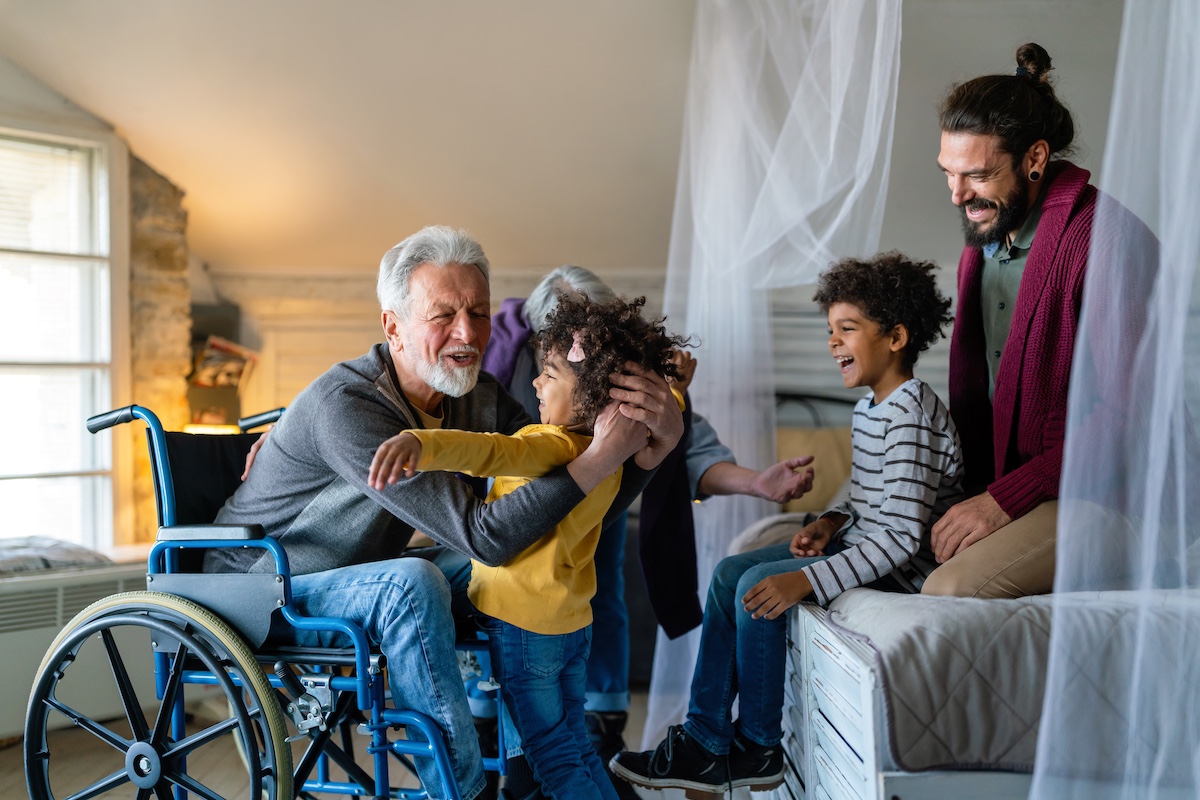If you are caring for a loved who has dementia, you are far from alone.
Around the world, someone is diagnosed with dementia every 3 seconds. More than 5 million Americans are living with Alzheimer’s disease, including 400,000 Texans. New cases are expected to grow significantly by 2050.
Dementia is a progressive condition that worsens over time, from mild to moderate to severe. This takes a devastating toll on those who care for loved ones with the disease.
At Crown Hospice, we have served many families affected by dementia. Here are some helpful ways to care for someone during this difficult experience.
Communication
As their condition progresses, your loved one will have difficulty expressing themselves and understanding others. There are several ways to help your loved one communicate more easily.
- Stay positive: Nonverbal communication becomes more important for people with dementia. Friendly body language, facial expressions and tone of voice will help them feel more comfortable.
- Limit distractions: Noisy, crowded or cluttered environments make it harder to focus. Turn off the radio or TV, and shut the door to limit distracting sounds. Address the person by name, introduce yourself, and maintain eye contact.
- Speak clearly: Use simple words, and speak slowly and distinctly. Don’t get frustrated if you need to repeat yourself. Use a reassuring tone of voice.
- Ask simple questions: Yes or no questions are easier to answer than open-ended ones. Only ask one question at a time, and avoid giving too many choices.
- Listen patiently: People with dementia often take longer to express themselves, so be patient while they speak. It’s okay to suggest some words if they’re struggling to find the right one. Your loved one may repeat themselves frequently. Don’t point this out to them. Just act as if you’re hearing their comment for the first time and respond accordingly.
- Offer reassurance: Your loved one may feel embarrassed if they keep making mistakes. Avoid correcting them. Instead, empathize with how they’re feeling. Offer praise when they complete a task and hold their hand when appropriate.
- Do some reminiscing: Long-term memories tend to last longer than short-term ones. Instead of asking what they had for lunch, get out some old photographs or play some favorite songs from their youth. Talking about good times from the past can be a big source of happiness and comfort.
- If they get upset: Offer a pleasant distraction if your loved one becomes agitated or frustated. Acknowledge their feelings — “I can see that you are sad” — and reassure them that you care. Changing the topic, moving to a different room, or going for a short walk may help them feel better.
Daily Tasks
Continue to include your loved one in regular activities as much as possible. Break things down into smaller steps that are easier to complete. Use memory aids like labels on drawers and cabinets, and offer frequent verbal reminders.
Eating and Drinking
People with dementia often forget to eat and drink. They may forget what foods they like, refuse to eat, or ask for unusual food combinations.
Schedule meals and snacks around the same time every day. Eat with your loved one, create a relaxing environment and allow plenty of time to finish. Offer finger foods if they have trouble with utensils, and cups that are easy to hold. Prepare smaller portions and be willing to accommodate changing taste preferences and dietary needs.
Using the Restroom and Incontinence
Bladder and bowel incontinence can be upsetting for patients and loved ones. The person may forget that they need to go or where the bathroom is.
Establish a restroom routine. Offer discreet reminders, and watch for signs that they need to go, such as fidgeting. Put a sign on the bathroom door. Encourage daily exercise, and avoid caffeine, alcohol and too much fluid before bedtime. Waterproof bedding, incontinence pads and a bedside commode are also helpful.
Above all, remember it’s not their fault if they have an accident. Stay positive and have a sense of humor when appropriate.
Washing and Bathing
People with dementia may get anxious about bathing. They may be afraid of falling or feel embarrassed about needing help with such a personal activity.
Be sensitive and respect you loved one’s dignity. Cover them with a towel and only lift it to wash as needed. Maintain their preferred routine as much as possible — do they like bathing in the morning or at night? Showers or tub baths?
Make the bathroom safe with nonslip floors, grab bars, adequate lighting and a comfortable temperature. A bath seat and handheld shower head are also a big help.
Sleeping
Dementia often interferes with sleep patterns. Your loved one may wake up more frequently or get confused about whether it’s day or night. For some patients, agitation and confusion get worse late in the day.
Encourage physical activity during the day, but not too close to bedtime. Limit naps, and avoid caffeine, sugar and alcohol. Help your loved one to go to bed and wake up at the same time. Remind them of the time of day by opening curtains in the morning, then closing them at dusk. Keep the bedroom comfortable, and provide a nightlight and easy-to-read clock.
If your loved one continues to have trouble sleeping, check with their doctor for possible treatments.
Common Behavioral Issues
Dementia brings many difficult changes for patients. Once-familiar faces become strangers. Activities that used to be easy suddenly become hard. As they struggle to cope with these changes, many patients may exhibit troubling behaviors that are alarming to those around them. Here’s how you can respond to some of the most common behavioral issues associated with dementia.
- Agitation: Patients may become agitated or aggressive if they feel afraid, frustrated or helpless. You can help by following a consistent routine and keeping familiar objects in the same places. Avoid loud noises, clutter and overstimulation. Keep dangerous objects out of reach. Encourage simple tasks and avoid activities that are too difficult. Allow as much independence as possible, and don’t physically restrain them unless their behavior becomes dangerous to themselves or others.
- Wandering: Sometimes your loved one may become disoriented and wander away from home, which is a serious safety risk. Change the locks on doors, or place barriers or curtains in front of doors you don’t want them to use. Install an alarm system that lets you know when certain doors are opened. You can also provide an ID bracelet or wearable GPS device in case your loved one becomes lost.
- Hallucinations: Your loved one may believe they are seeing people or things that aren’t really there. This is a very scary experience for them. Don’t tell them that their hallucination isn’t real, which only increases their confusion. Instead, reassure them that you are there to help and distract them with a pleasant activity. Keep rooms well-lit to avoid shadows, which may appear frightening when the patient becomes disoriented. Talk to their doctor about possible treatments to reduce hallucinations.
- Paranoia: Sometimes patients may become suspicius, jealous or fearful of being harmed. They may accuse friends or family members of stealing, infidelity or other wrongdoings. It is important not to take such accusations personally, as this is part of the disease process. Listen to their concerns, empathize with how they feel and offer to help look for “missing” items.
Taking Care of Yourself
Finally, remember that it’s hard to care for your loved one if you don’t feel well yourself. Talk to family and friends about sharing caregiving duties so that no one person becomes overwhelmed. Reach out to local organizations that provide help for families affected by dementia, or join a community support group.
Respite care services are another great way to make sure your loved one gets the care they need while you take a break. This can include visits from a home healthcare professional, adult day care centers or a temporary stay in a skilled nursing home.
At Crown Hospice, we provide caregiver support for families as well as palliative care for your loved one. If you have questions about caring for a loved one dementia or need more information about hospice care, please contact us at any time.




